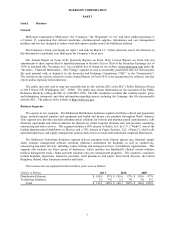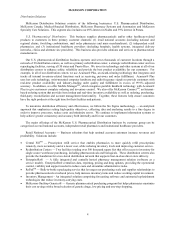McKesson 2011 Annual Report Download - page 19
Download and view the complete annual report
Please find page 19 of the 2011 McKesson annual report below. You can navigate through the pages in the report by either clicking on the pages listed below, or by using the keyword search tool below to find specific information within the annual report.McKESSON CORPORATION
13
Healthcare Fraud: We are subject to extensive and frequently changing local, state and federal laws and
regulations relating to healthcare fraud, and the federal government continues to strengthen its position and scrutiny
over practices involving fraud affecting Medicare, Medicaid and other government healthcare programs. Our
relationships with pharmaceutical and medical-surgical product manufacturers and healthcare providers, as well as
our provision of products and services to government entities, subject our business to laws and regulations on fraud
and abuse, which among other things (1) prohibit persons from soliciting, offering, receiving or paying any
remuneration in order to induce the referral of a patient for treatment or for inducing the ordering or purchasing of
items or services that are in any way paid for by Medicare, Medicaid or other government-sponsored healthcare
programs, (2) impose a number of restrictions upon referring physicians and providers of designated health services
under Medicare and Medicaid programs, and (3) prohibit the knowing submission of a false or fraudulent claim for
payment to a federal health care program such as Medicare and Medicaid. Many of the regulations applicable to us,
including those relating to marketing incentives, are vague or indefinite and have not been interpreted by the courts.
They may be interpreted or applied by a prosecutorial, regulatory, or judicial authority in a manner that could
require us to make changes in our operations. If we fail to comply with applicable laws and regulations, we could
suffer civil and criminal penalties, including the loss of licenses or our ability to participate in Medicare, Medicaid
and other federal and state healthcare programs.
Reimbursements: Both our profit margins and the profit margins of our customers may be adversely affected by
laws and regulations reducing reimbursement rates for pharmaceuticals, medical treatments and related services, or
changing the methodology by which reimbursement levels are determined. For example, the Patient Protection and
Affordable Care Act and the Health Care and Education Reconciliation Act (collectively the “Affordable Care
Act”), signed into law in 2010, revised the federal upper limits for Medicaid reimbursement for multiple source
generic drugs available for purchase by retail community pharmacies on a nationwide basis to a limit of not less than
175% of the weighted average (determined on the basis of utilization) of the most recently reported monthly average
manufacturer price (“AMP”) using a smoothing process. In addition, Medicare, Medicaid and the State Children’s
Health Insurance Program (“SCHIP”) Extension Act of 2007 requires the Centers for Medicare and Medicaid
Services (“CMS”) to adjust the calculation of the Medicare Part B drug average sales price (“ASP”) to an actual
sales volume basis. We expect that the use of an AMP benchmark and the revised ASP calculations would result in
a reduction in the Medicaid reimbursement rates to our customers for certain generic pharmaceuticals, which could
indirectly impact the prices that we can charge our customers and cause corresponding declines in our profitability.
There can be no assurance that these changes would not have a material adverse impact on our results of operations.
Operating, Security and Licensure Standards: We are subject to the operating and security standards of the
Drug Enforcement Administration (the “DEA”), the Food and Drug Administration (“FDA”), various state boards of
pharmacy, state health departments, the U.S. Department of Health and Human Services (“HHS”), the CMS and
other comparable agencies. Certain of our businesses may be required to register for permits and/or licenses with,
and comply with operating and security standards of the DEA, FDA, HHS, CMS, various state boards of pharmacy,
state health departments and/or comparable state agencies as well as foreign agencies and certain accrediting bodies,
depending upon the type of operations and location of product distribution, manufacturing and sale. As part of these
operating, security and licensure standards, we regularly receive requests for information and occasionally
subpoenas from government authorities. Although we believe that we are in compliance in all material respects with
applicable laws and regulations, there can be no assurance that a regulatory agency or tribunal would not reach a
different conclusion concerning the compliance of our operations with applicable laws and regulations. In addition,
there can be no assurance that we will be able to maintain or renew existing permits, licenses or any other regulatory
approvals or obtain without significant delay future permits, licenses or other approvals needed for the operation of
our businesses. Any noncompliance by us with applicable laws and regulations or the failure to maintain, renew or
obtain necessary permits and licenses could have a material adverse impact on our results of operations.
Pedigree Tracking: There have been increasing efforts by various levels of government agencies, including
state boards of pharmacy and comparable government agencies, to regulate the pharmaceutical distribution system
in order to prevent the introduction of counterfeit, adulterated and/or mislabeled drugs into the pharmaceutical
distribution system (“pedigree tracking”). Certain states have adopted or are considering laws and regulations that
are intended to protect the integrity of the pharmaceutical distribution system, while other government agencies are
currently evaluating their recommendations. For example, Florida has adopted pedigree tracking requirements and
California has enacted a law requiring chain of custody technology using radio frequency tagging and electronic
pedigrees, which will be effective for us in July 2016.
























